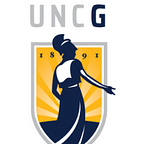The Fight for Change: Why Youth Are the Future of the World
“We, as youth, must now be the change that we seek. If you don’t stand for something, you’ll fall for anything.” D’Angelo McDade, March for Our Lives 2018
What are the ways we define change? How many steps does it take to push forward and see it through?
How do we define the future? And more importantly, WHO defines the future?
In 1988, the Research Excellence Awards at UNCG were established in recognition of the following principle:
“Given that creating and diffusing knowledge is a formal obligation of the University, the Research Excellence Award will be given to a full-time member of the faculty whose work contributes in an exemplary fashion to this end.”
We see “the creation and diffusion of knowledge” as a prevalent part of change-making in today’s society, especially with the fight against systemic racism, female subjugation, and police violence. We have discovered that education is the key to understanding how to combat injustices, for we will not learn unless we push through, time and time again.
Activism matters, and one UNCG professor believes that the youth are the ones who define the future.
Dr. Risa Applegarth has dedicated her work to analyzing the power of youth activism, specifically within the March for Our Lives movement. The movement, which started in 2018, is a student-led demonstration for the ending of gun violence in America.
“I’m frustrated with media coverage framing their activism as success or failure — the idea that elections will show whether they succeeded,” Applegarth says. “By listening to what these teens have to say, I hope to demonstrate additional ways their activism matters — from networks they’ve formed, to speaking, writing, and organizational capacities developed, to engagement with local and state officials and organizations.”
Receiving the Junior Research Excellence Award for her work in rhetoric, Applegarth, a professor of English and women’s, gender, and sexuality studies, focuses on scientific and professional discourse and social movements. She is widely recognized for her scholarship and teaching, with accolades including the Outstanding Book Award from the Conference on College Composition and Communication and UNCG’s Mary Settle Sharp Award for Teaching Excellence.
“My research considers how people use their bodies to disrupt public space and try to bring attention to different matters — from their clothing and appearance to demonstrations, sit-ins, and protests,” Applegarth says.
“Civility doesn’t always get the job done, and civility doesn’t only go one way.”
Applegarth’s upcoming book will be about youth protest and will discuss the rise in activism for climate change among youth.
“Quite a few people have taken umbrage with the challenging nature of young climate activist Greta Thunberg’s rhetoric. ‘You should be ashamed,’ she tells leaders. ‘Our house is on fire and you’ve done nothing.’ She uses a lot of condemnatory language that can be hard for audiences to hear,” Applegarth says.
But it is Thunberg’s language that has sparked outrage, a hunger for change among youth. Youth activism is at a powerful and impactful level, although female leaders have been discovering for a long while the difference between what is truth, and what is reality.
“There’s a lot of discussion in creative nonfiction and many academic disciplines about the line between fact and truth and knowledge and reality,” Applegarth explains. “Women researchers were wrestling really early with questions of how representation affects reality and whether the way you write can shape both the perception and reality of the thing you’re writing about.”
However, “Our understanding of an issue can be changed by bodies making us think differently.”
The fights for change in our world cannot be achieved without the empowerment of the youth.
We must continue to educate ourselves.
We must continue to fight for change.
We must continue to think differently and challenge our perspectives.
The youth are the future, and the strive for justice in all sectors can be achieved with further engagement.
“I am inspired by how many of my students came to UNCG because they want to be in diverse classrooms,” gushes Applegarth. “When we talk about challenging issues — that they do not all have the same prior experiences with, that they do not all agree about — they bring so much openness, energy, and honest, earnest desire to engage and understand one another.”
These conversations are the ones we must continue to have. If we can continue to support, educate, and value one another, then we shall be headed towards a brighter future.
A stronger future.
Because after all, we are better together.
